- Home
- Mack Reynolds
Space Visitor Page 4
Space Visitor Read online
Page 4
He was very handsome, every feature all but perfect; the type of attractiveness that irritates many men and doesn’t thrill as many women as is often assumed. He came to his feet at their entry and said, in a nice voice that went along with his face, “My name is Jean Hippolyte Foucault, and I in literally yours to command. I will live here am literal with you, at least for the time being. I am in on the secret. I am a Moroccan of French descent, which is probably one of the reasons Director Vogel chose me. My nation is unaligned and has no particular interest in any of the ramifications of space travel.”
“What secret?” Brecht asked bluntly.
The French-Moroccan smiled at him. “You are Sehor Brecht?” He used the Spanish form of address, rather than the Esperanto in which they were talking.
“That’s right,” Brecht said.
“The secret that a space probe, or whatever you wish to call it, has been found on Luna. A spacecraft from an intelligence alien to Earth. I don’t believe it, of course, but that’s the secret.”
“Would it be possible for us to go somewhere where we could sit down?” Li Ching asked. “The gravity is terrible. I can hardly stand.”
Jean Foucault was immediately concerned. “Right this way,” he said, ushering them through a door to the left of the desk.
In a monstrous living room that easily could have seated thirty persons on its collection of out-sized chairs and couches, the six of them slumped with undisguised relief into seats near each other.
Foucault was saying, “I am to be a cross between a butler, a bodyguard, an anti-press agent, a Man Friday, a bartender, and———”
“I say, what’s a bloody anti-press agent?” Brett-James interrupted.
The French-Moroccan looked at the Englishman. “Someone who keeps the press away. It is to be assumed they will make aggressive at-tempts to speak with you. The secret is already out—”
“It is?” Brecht exclaimed.
The other turned to him with his inevitable smile. “I was about to say that the secret is out that there is a secret. It’s already known that something at least passingly strange has happened at the Ozma project. The rumors are that at long last you have picked up radio signals from space of an intelligent nature, which is why you’ve been hurried back to report before your six months were up. At any rate, in my role as bartender, could I get any of you a drink?”
“Jesus, yes,” Zimmerman said, and the rest of them nodded.
There was an enormous and quite elaborately stocked bar against one wall of the living room. As Foucault crossed to it, he said over his shoulder, “Name your poison, as the Americans say. We have, or can order for you, literally anything. This penthouse, as you may possibly have guessed, usually houses the most important VIPs. I believe that last occupant was the Chairman of the Presidium from Moscow; in other words, Number One. Shall we say champagne?”
“By all means say it,” Brett-James agreed. “And bring it.”
“From the sizable refrigerator behind the bar, their Man Friday brought forth a magnum of champagne. He looked at the label critically. “Mumm’s Cordon Rose, the very best of the celebrated pinks. Good vintage year, too.”
As he was opening and pouring the wine, Brecht asked, “What was it you said to the effect that you didn’t believe I discovered the spacecraft?”
Foucault returned with seven glasses and the magnum of champagne on a silver tray. He passed the drinks around, smiling politely at Brecht. Then set the tray down on a cocktail table and took up the seventh glass.
Finally addressed himself to Brecht, “Now really, it isn’t very believable, you have to admit.”
Brecht shrugged and reached into an inner pocket of the suit he was now wearing. They had all changed from the space coveralls that were the uniform on Luna to more fashionable attire shortly before setting down at the spaceport. He brought forth a couple of the photos and handed them to their skeptical host. As expected, Foucault’s eyes widened in disbelief.
“Good heavens, this tastes good,” Mary Lou said, “Just imagine, we don’t have to worry about our liquor intake any more. We don’t have to worry about coming down with space cafard. We don’t have to worry about anything.”
“Ha!” Brett-James said grimly. “Yawl are dreaming, I shouldn’t doubt. You don’t think we’re going to convince anybody down here that the Kraut didn’t tell the rest of us where that damn spaceship is, do you? I say, wait until they’ve put the jolly old thumbscrews to you.”
Brecht finished off his glass of champagne and reached for the bottle. Foucault was still staring at the photos and shaking his head.
Zimmerman said, “Better take it easy on this stuff. We’re not used to a lot of booze and we don’t know how long it will be before the bad guys show up. Or are they supposed to be the good guys?”
Brett-James looked at Foucault. “Which reminds me… What is the drill, old chap? When are we scheduled to be put through the bloody wringer?”
A doctor from the Ozma Department will arrive very shortly, as soon as you have, ah, caught your breaths. He will examine you—purely routine. If he feels you are sufficiently fit, you will have your preliminary interview with Director Vogel, the President of United America…”
“The President!” Mary Lou exclaimed. -
“… the Premier of Common Europe, the Foreign Minister of the Soviet Complex, and the Foreign Minister of the People’s Republic of China.”
“And no one else?” Brecht asked in a flat voice. “These five men, and yourself, are the only ones that have been let in on the—the secret?”
“That is correct,” Foucault said. “The only reason I’m in on it is that somebody has to run interference for you. If anyone at all shows up who can’t be avoided, such as the waiters or the maids who maintain the suite, I will always be present.”
“I note that you’re heeled too,” Zimmerman commented mildly.
Foucault looked sharply at the Israeli, then nodded. “When I received my instructions from Director Vogel he told me that this is the most important development that has ever occurred in the history of the human race. I am to protect you with my life, especially Senor Brecht.”
“Very dramatic,” Brecht muttered, pouring himself another glass of wine, despite Zimmerman’s advice. He eyed the French-Moroccan. “You mean to tell me that not even the Secretary General of the Reunited Nations is in on this?”
“That is correct,” Foucault said again as he sipped his own wine appreciatively. “The four nations named all have space programs; none of the others do.”
Azikiwe Awolowo, her dark face angry, snapped, “Then the majority of the human race is not even to be told of this supposedly most important development that has ever happened to our species?”
“This is correct, Doctor Awolowo,” he said for the third time. He shrugged. “I did not make the rules. I’m a flunky whose two principal attributes are that I am connected with the Ozma Department and hence am up on the subject of space and its exploration and that I once won an Olympic gold medal for handguns.”
“When do we eat?” Mary Lou put in. “I’m starved, and although this wine is delicious, it’s beginning to get to me.”
Foucault was immediately contrite. “My sincere apologies,” he said. “I am an inadequate host.” He hurried from the room.
“Is he our host or the butler? I can’t keep track,” said Zimmerman.
“Don’t be a snob, Kike,” Mary Lou said. “Who cares if the butler sits down and helps you drink the champagne?”
When the French-Moroccan returned approximately fifteen minutes later, he was followed by four waiters pushing carts. They were accompanied by two of the guards who had remained out in the hall. As usual, their right hands were under their jackets.
Foucault said to the Luna team, “Please do not speak while these others are present and please remain seated where you are.”
“I say, what bullshit,” Brett-James muttered.
The French-Moroccan ignored him
and led his group through the room and into what the six assumed was the suite’s dining room. In no more than five minutes, the parade returned, the carts empty, the eyes of the waiters straight ahead, their expressions frozen. They marched out and were gone.
Their Man Friday, as he had named himself, returned and with his ever-present smile, gestured and announced, “Ladies and gentlemen, luncheon is served.”
The food was exquisite, the first they had eaten under normal conditions for over five months.
Brecht said to Mary Lou, “You know, Yawl, this is considerably finer cuisine than you used to come up with on the moon. I’m beginning to have second thoughts about marrying you.”
“No appreciation,” Mary Lou muttered, digging in with the same gusto being exhibited by the others.
Zimmerman addressed Foucault, who was serving them, “What would have happened if, when those four characters came through pushing the carts, I had suddenly yelled, ‘Guess what, there’s an alien spaceship up on the damned moon!’?”
The other poured more claret for the Israeli, then said easily, “I am glad that you didn’t, Doctor Zimmerman. I am not sure, but I assume that all four of them and the two guards who accompanied them would have been detained under top security conditions. I assume it would have been most uncomfortable for them in solitary confinement.”
Zimmerman looked at Brecht sourly. “Listen, Kraut, why the hell didn’t you just blow the damn thing up and forget about it?”
Brecht took a deep breath. “I’ll tell you something, Kike, for a long time I considered doing just that.”
Foucault looked from one to the other. “Kraut… Kike…?”
Azikiwe laughed. “You see, we’re all pretty close, and we have affectionate nicknames for each other,” she explained.
CHAPTER SIX
Following the meal, they returned to the living room for a short time, then Foucault showed them about the suite and had them choose their bedrooms. He showed no particular surprise when Azikiwe selected a room with Brett-James, Li Ching with Zimmerman, and Brecht with Mary Lou. He went himself to get their luggage, which had evidently been delivered to the reception room.
The women especially ohhed and ahhed about the size of the suite, and about the view of the city from the living room window. None of them had ever been quartered so splendidly.
The feeling of apprehension still lay over them like a pall, however, and the increased gravity was with them as well, so they soon staggered back to the living room and allowed their guardian to bring them liqueurs by way of a digestive.
There was the tinkle of a bell and Foucault hurried to the door. He returned with a feisty-looking, middle-aged man, who carried two doctor’s bags. The guards who accompanied him turned and left.
When the door was closed behind them, the newcomer said to Foucault indignantly, “Do you realize that when this examination is over I am to be detained indefinitely? That I am to be confined without any communication whatsoever, even with members of my family?”
“Yes,” Foucault agreed pleasantly. “But I trust it will be only a short time, actually, and that you will be most fully recompensed. And here are your patients.” He presented the six by name. “If I am not mistaken, you are Doctor Oswaldo Klein, of Vienna.”
“Correct,” the newcomer snapped. “Now, what is all this mumbo jumbo about?”
The French-Moroccan said gently, “Undoubtedly, Doctor, you have already been informed that your conversation is to be limited strictly to medical matters.”
Klein snorted, “Very well. Which room can I utilize for the examinations? I’ll take Ms. Pickett first.”
Foucault shook his head smilingly. “It is necessary that the whole group, including me, remain together, Doctor.”
The other stared at him. “As you know, this is a physical examination.”
“As you know, this Luna City team has lived together in the greatest intimacy for five months. As for me, I’ll turn my back, but I’ll be present.”
“Utter nonsense!” the doctor exclaimed.
The examinations proved to be cursory. They were all, on the face of it, in top physical shape.
He wound up by telling them gruffly, “You should have no difficulty. A mere two or three days should relieve you of any current gravity problems.” He looked at Max Zimmerman approvingly. “You must have had an excellent exercise program on Luna, Doctor.”
Li Ching said indignantly, “He worked us to a frazzle.”
“You do not appear to be in a frazzle, my dear. You are a very attractive young woman.”
“Listen to the man, Chink.”
The doctor blinked at him. “Chink?” He shook his head and took up his bags.
Foucault ushered him to the door and turned him over to the two guards who had remained in the reception room.
The six members of the team resumed their chairs.
Zimmerman said, “All this treatment is fine, but you know what I feel like?”
They all eyed him.
“Those conspirators who were charged with planning the assassination of Abraham Lincoln. When they were in prison, and then when they went on trial, they had sacks over their heads so that they couldn’t talk. And when they were executed, it was the same. The doctor who treated Booth’s broken leg was placed in solitary confinement until he died. He was never allowed to be in a position of talking to someone about what Booth might have said to him.”
Brett-James glanced suggestively at the bar. “I say, old chap, what happens now?” he asked Foucault.
“Sorry, Commander Brett-James, I do not know.”
“Then I suggest we investigate the Scotch situation, don’t you know? We might as well live it up before they throw us out of these digs.”
Brecht grunted in sour deprecation. “I have a suspicion we’re going to be in these digs for a long, long time.”
By the time Foucault had brought them their Scotch and sodas, the bell tinkled again and he hurried to the door to the reception room.
Brecht said, his voice still sour, “After this is all over and they’ve given me the Nobel Prize, I think I’ll hire our boy to be my butler.”
“Nobel Prize?” Azikiwe echoed. “Listen, Kraut, they’re more apt to award you a bullet in the head.”
At this point Foucault returned with a group of five men; and even the seemingly easygoing French-Moroccan was obviously impressed. The five were attired in very conservative business suits. The average age was sixty, and all five were men born to command.
They lined up in a row. The Luna team had already risen to their feet.
Foucault said formally, “Doctor Azikiwe Awolowo, Ms. Mary Lou Pickett, Doctor Li Ching, Commander Kingsley Brett-James, Doctor Max Zimmerman, Doctor Werner Brecht; may I present you to Their Excellencies, President Seymour Rice of United America, Premier Olaf Gunther of Common Europe, Foreign Minister Yul Konov of the Soviet Complex, Foreign Minister Yuan Lung of the People’s Republic of China, and Director Nilsson Vogel of the Ozma Department of the Reunited Nations.”
Yuan Lung nodded to Li Ching. “I knew your illustrious father, Comrade Li.”
She bobbed her head. “He has mentioned your name with great respect many times in our home, Comrade Yuan.”
President Seymour Rice’s well-known qualities were immediately evident; his beaming face, his magnetic personality, his hearty masculinity, his notoriously mild intelligence were all apparent.
Since they were in United America, he assumed the role of host. “Shall we be seated, ladies and gentlemen?” He looked at Foucault. “You, my man, could you take orders for refreshments?”
“Yes, Mr. President, of course.”
All now seated, with cocktails near at hand—orange juice in the case of the representative of the People’s Republic—Olaf Gunther, of Common Europe, was the first to speak; in Esperanto, of course.
“If I understand correctly, Doctor Brecht, you are the geologist who inadvertently made the alleged discovery.”
“Yes, Your Excellency.”
“Frankly, I do not believe it.” He was a heavy man, his face granite hard.
Werner Brecht reached into his pocket and brought forth the photos. He put them on the large cocktail table around which they all sat and leaned back, his dark eyes bright. The snapshots were sufficient in number that each of the world leaders could immediately peruse two or three before handing them around to the others.
Yul Konov said, “It looks like a Vostok.”
“Superficially,” Brecht replied. “But look at the photo that Premier Gunther has. That’s me—in a spacesuit, of course—up against it. The Vostok wasn’t nearly that size. Also notice those nubby antennae, or whatever they are; the Vostok didn’t have any such thing. Besides, it’s not metal, so far as I know, and it’s not what you might call plastic, nor is it ceramic. I don’t know what it is and I rather doubt that anybody on Earth would either.”
Yul Konov leaned forward. “Doctor Brecht, this has come as a shock to all of us, I am sure. You have, thus far, revealed few details. According to Director Vogel, you have actually refused to disclose the location of the spacecraft.”
“Yes, Your Excellency.”
There was a moment’s silence.
Then President Rice snapped, “Why, for God’s sake?”
He told them substantially the same story he had told his five companions in Luna City on the occasion of his revelation of the existence of the spaceship from beyond the solar system.
When they had heard him out, Olaf Gunther said testily, “Doctor Brecht, has it not occurred to you that it might be better to leave the decision to more competent, wiser persons?”
“Yes, it has,” Brecht agreed. “But what more competent, wiser persons? Yourselves? You represent the world’s most powerful nations, and not one of you trusts any one of the others. You’re all armed to the teeth with nuclear weapons, all ready to spring. I don’t know what technology is in in the space vehicle, but I don’t trust it in the hands of the governments of any of your nations.”

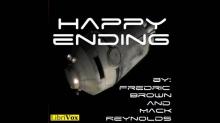 Happy Ending
Happy Ending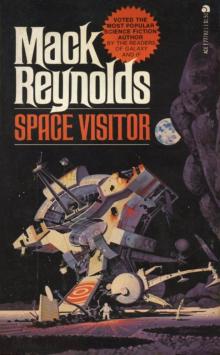 Space Visitor
Space Visitor A Kiss Before Loving
A Kiss Before Loving Episode on the Riviera
Episode on the Riviera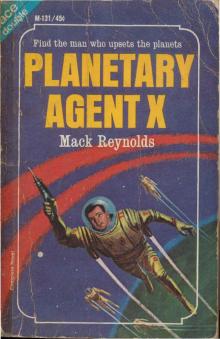 Planetary Agent X
Planetary Agent X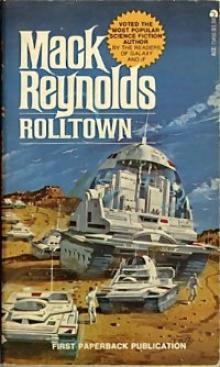 Rolltown bh-3
Rolltown bh-3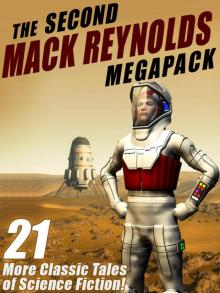 The Second Mack Reynolds Megapack
The Second Mack Reynolds Megapack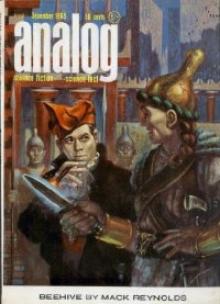 Dawnman Planet up-2
Dawnman Planet up-2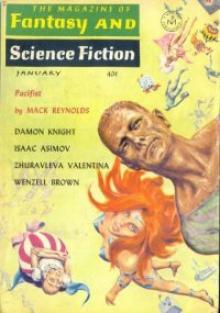 Pacifist
Pacifist The Other Time
The Other Time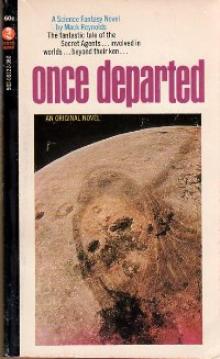 Once Departed
Once Departed IQ
IQ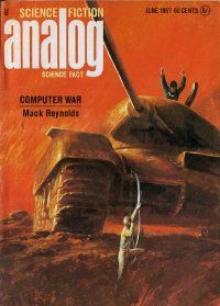 Computer War
Computer War Earth Unaware
Earth Unaware The Rival Rigelians up-3
The Rival Rigelians up-3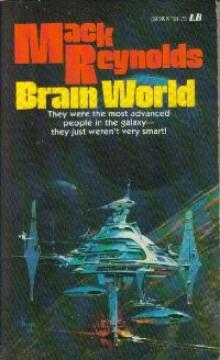 Brain World up-7
Brain World up-7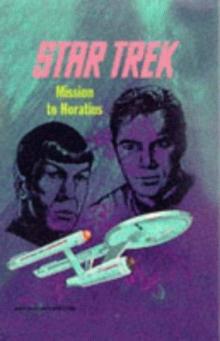 Star Trek - TOS - Mission to Horatius
Star Trek - TOS - Mission to Horatius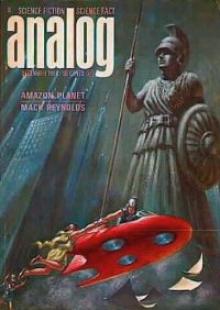 Amazon Planet up-5
Amazon Planet up-5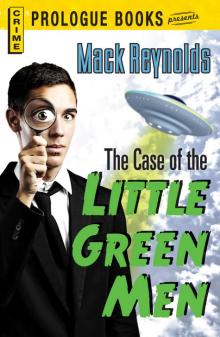 The Case of the Little Green Men
The Case of the Little Green Men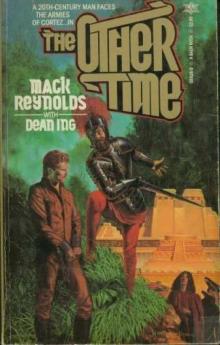 Other Time
Other Time The Mack Reynolds Megapack
The Mack Reynolds Megapack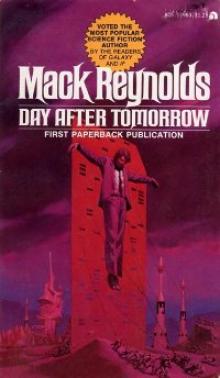 Day After Tomorrow
Day After Tomorrow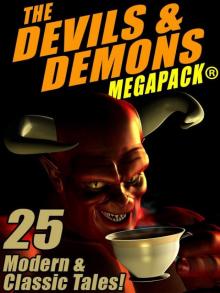 The Devils & Demons MEGAPACK ®: 25 Modern and Classic Tales
The Devils & Demons MEGAPACK ®: 25 Modern and Classic Tales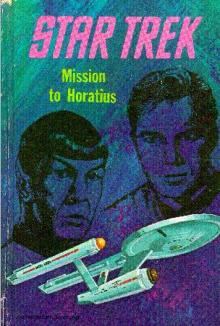 Mission to Horatius
Mission to Horatius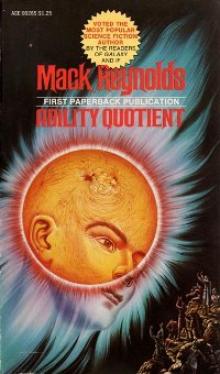 Ability Quotient
Ability Quotient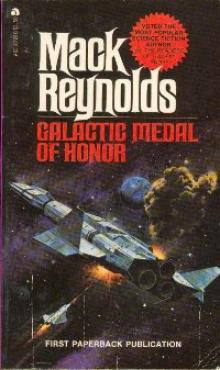 Galactic Medal of Honor
Galactic Medal of Honor Trojan Orbit
Trojan Orbit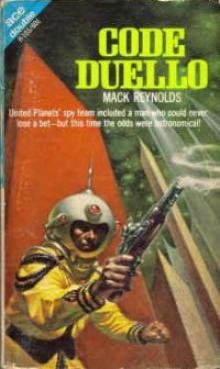 Code Duello up-4
Code Duello up-4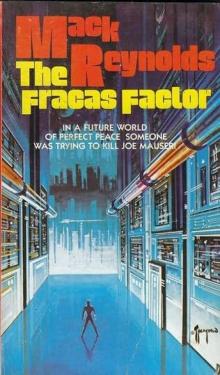 The Fracas Factor
The Fracas Factor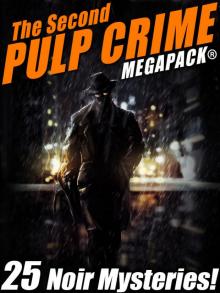 The Second Pulp Crime
The Second Pulp Crime Deathwish World
Deathwish World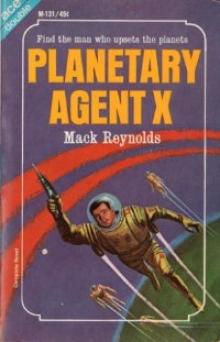 Planetary Agent X up-1
Planetary Agent X up-1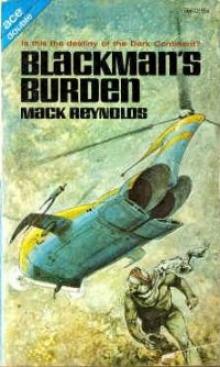 Blackman' Burden na-1
Blackman' Burden na-1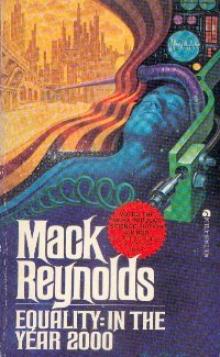 Equality: In the Year 2000 jw-2
Equality: In the Year 2000 jw-2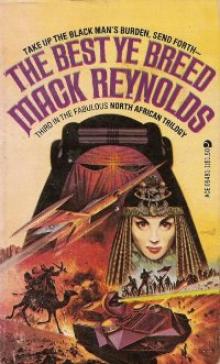 The Best Ye Breed na-3
The Best Ye Breed na-3 The Jet Set
The Jet Set The Rival Rigelians
The Rival Rigelians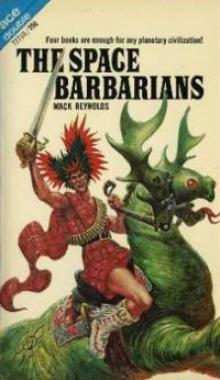 The Space Barbarians
The Space Barbarians